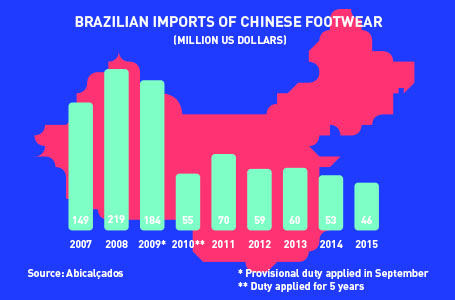Anti-dumping duty extended in Brazil

As communicated by the Ministry of Development, Industry and Foreign Trade (MDIC), from the 2nd of March onwards the surcharge applied to footwear imported from China will be 10.22 US dollars per pair
The value of the duty was 13.85 US dollars in the original decree of 2010, which set up the measure for a period of five years. The new duty, lower, will be applied for a period of five years, the maximum allowed by the WTO (World Trade Organization)
Abicalçados, the Brazilian Footwear Association, congratulates the decision. Its President, Heitor Klein, who in the past three weeks was in Brasilia accompanied by an entourage of footwear companies seeking support for the extension of the right, underlines the importance of the measure. "Certainly, the surcharge renewal will give more tranquility to national producers when planning a year that will be difficult, but it would be much more if we had to compete without the trade defense tool against the Chinese product," he said. In his view, this is an important measure, as 2015 saw Brazilian footwear production falling by 7.6% due to shrinking demand in the domestic market.
According to Heitor Klein, before the implementation of the decree in 2009, national production suffered the impacts of the entry of Chinese goods coupled with low prices. He recalled that before the adoption of the duty footwear production was just over 800 million pairs, a figure that has nearly 900 million the following year. "Only in the six months following the adoption of the duty the industry recovered more than 40 thousand jobs in the industry", he stated.
In 2009 imports of Chinese footwear reached roughly 183.6 million US dollars, about 70% of the total imported by Brazil. After application of the duty, in 2010, the number dropped to 54.9 million US dollars, and footwear imports coming from China represented only 18% of total Brazilian imports. According to Abicalçados, in 2015, imports of footwear from China reached 45.9 million US dollars, 80% lower than before the application of the duty.

Heitor Klein denies that the anti-dumping is a protectionist measure: "We are in favor of free competition, provided it is in terms of equality, which does not happen when it comes to Chinese product," he said. "Moreover, the opinion of the Trade Defence Department of the Foreign Trade Secretariat (Secex / MDIC) is extremely well grounded and irreproachable, strictly following the provisions of international law, governed by the World Trade Organization," he added.
Abicalçados, the Brazilian Footwear Association, congratulates the decision. Its President, Heitor Klein, who in the past three weeks was in Brasilia accompanied by an entourage of footwear companies seeking support for the extension of the right, underlines the importance of the measure. "Certainly, the surcharge renewal will give more tranquility to national producers when planning a year that will be difficult, but it would be much more if we had to compete without the trade defense tool against the Chinese product," he said. In his view, this is an important measure, as 2015 saw Brazilian footwear production falling by 7.6% due to shrinking demand in the domestic market.
According to Heitor Klein, before the implementation of the decree in 2009, national production suffered the impacts of the entry of Chinese goods coupled with low prices. He recalled that before the adoption of the duty footwear production was just over 800 million pairs, a figure that has nearly 900 million the following year. "Only in the six months following the adoption of the duty the industry recovered more than 40 thousand jobs in the industry", he stated.
In 2009 imports of Chinese footwear reached roughly 183.6 million US dollars, about 70% of the total imported by Brazil. After application of the duty, in 2010, the number dropped to 54.9 million US dollars, and footwear imports coming from China represented only 18% of total Brazilian imports. According to Abicalçados, in 2015, imports of footwear from China reached 45.9 million US dollars, 80% lower than before the application of the duty.

Heitor Klein denies that the anti-dumping is a protectionist measure: "We are in favor of free competition, provided it is in terms of equality, which does not happen when it comes to Chinese product," he said. "Moreover, the opinion of the Trade Defence Department of the Foreign Trade Secretariat (Secex / MDIC) is extremely well grounded and irreproachable, strictly following the provisions of international law, governed by the World Trade Organization," he added.











